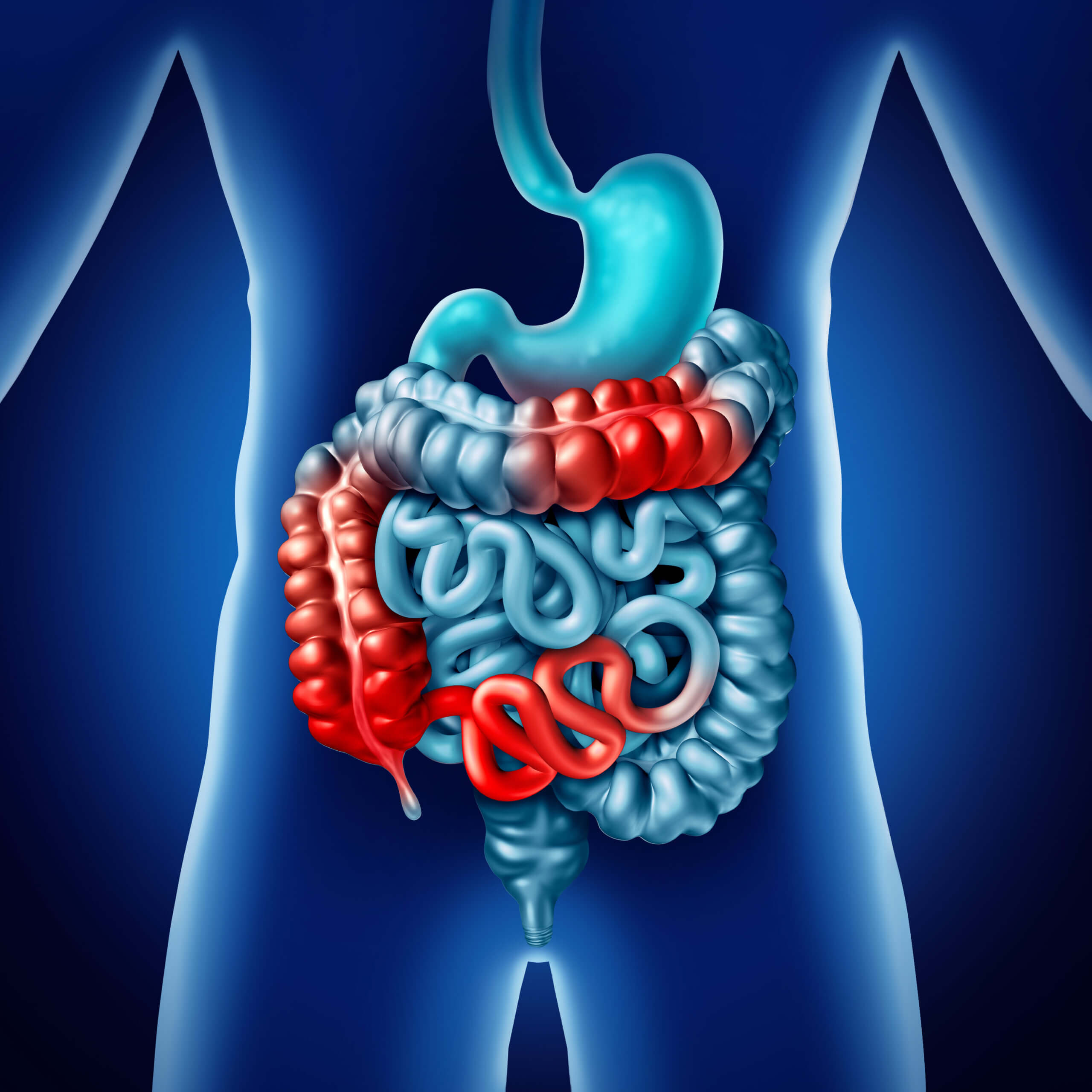Crohn’s Disease

Crohn’s disease is a particular type if inflammatory bowel disease. It is an autoimmune disorder that occurs as a result of your body’s immune system attacking it own cells.
Symptoms include: Severe diarrhea, abdominal pain, fever, and fatigue. Other symptoms include: Anemia, arthritis, inflammation of the eye, and skin rashes. You may experience a few or many of these symptoms and they may be mild or severe. These symptoms may go into remission where you experience no symptoms at all.
Treatment Options include: Diet changes, multivitamins, quitting smoking, reducing stress, and various medications. Medication options include: Immunosuppressants, biologics, anti-diarrheal medications, and pain killers. Understand that some medications may aggravate, rather than help symptoms. For some patients, surgery is required.
Navigating the Challenges: Understanding and Conquering Crohn's Disease
In the realm of chronic illnesses, one that has garnered significant attention due to its complex nature and impact on daily life is Crohn’s disease. This inflammatory bowel disease (IBD) strikes at the core of an individual’s well-being, affecting not only physical health but also emotional and social aspects. In this article, we delve into the intricacies of Crohn’s disease, its symptoms, challenges, and available management strategies.
The Essence of Crohn’s Disease: Crohn’s disease is a chronic inflammatory condition that primarily affects the digestive tract. It belongs to a family of disorders known as inflammatory bowel diseases, which also includes ulcerative colitis. Crohn’s disease can occur anywhere along the digestive tract, from the mouth to the anus, but it most commonly affects the small intestine and the beginning of the large intestine.
- Symptoms and Signs: The symptoms of Crohn’s disease can vary widely and often include abdominal pain, diarrhea, weight loss, fatigue, and loss of appetite. The condition is characterized by periods of active inflammation (flares) followed by periods of remission. During flares, symptoms can be severe and debilitating, significantly impacting daily life and overall quality of life.
- Challenges and Impact: Living with Crohn’s disease presents a multitude of challenges beyond physical discomfort. The unpredictability of flares can lead to anxiety and social isolation, while the need for frequent restroom visits may interfere with work, school, and social activities. Individuals with Crohn’s disease often face dietary restrictions and must navigate a careful balance to manage their symptoms.
- Diagnosis and Treatment: Diagnosing Crohn’s disease involves a combination of medical history, physical examination, imaging tests, and endoscopy. Treatment strategies vary based on the severity of the disease and may include medications to reduce inflammation, manage symptoms, and suppress the immune system. In severe cases, surgery may be necessary to remove damaged portions of the intestine.
- Lifestyle Considerations: Managing Crohn’s disease often requires a multi-faceted approach. Lifestyle modifications such as adopting a well-balanced diet, managing stress, getting regular exercise, and staying hydrated can all contribute to symptom management and overall well-being.
- The Role of Support: Support systems play a crucial role in the lives of individuals with Crohn’s disease. Friends, family, healthcare professionals, and patient support groups provide emotional encouragement, practical advice, and a sense of community for those navigating the challenges of the disease.
- Research and Hope: As medical understanding of Crohn’s disease continues to evolve, research is focused on improving treatment options and enhancing the quality of life for affected individuals. Advances in medications, therapies, and techniques for managing flares offer hope for a brighter future.
Triumphing over Challenges Living with Crohn’s disease requires resilience, determination, and a comprehensive approach to health management. While the journey may be challenging, individuals with Crohn’s disease can find solace in a supportive network, effective treatment strategies, and the constant pursuit of betterment. By fostering awareness and understanding of this complex condition, we can contribute to a more empathetic and informed society that stands united in the face of Crohn’s disease’s challenges.
Crohn's Disease Diets to Minimize Symptoms
Navigating Crohn’s Disease: The Transformative Power of a Carefully Planned Diet
 In the realm of chronic illnesses, Crohn’s disease stands as a formidable challenge, affecting not only the physical health but also the emotional and social well-being of those who grapple with its unpredictable symptoms. Amid the complexities of managing this inflammatory bowel disease (IBD), there’s a beacon of hope that shines through: a carefully planned diet. In this article, we explore how a thoughtfully constructed dietary plan can truly make a significant impact on alleviating Crohn’s disease symptoms and enhancing the quality of life for those affected.
In the realm of chronic illnesses, Crohn’s disease stands as a formidable challenge, affecting not only the physical health but also the emotional and social well-being of those who grapple with its unpredictable symptoms. Amid the complexities of managing this inflammatory bowel disease (IBD), there’s a beacon of hope that shines through: a carefully planned diet. In this article, we explore how a thoughtfully constructed dietary plan can truly make a significant impact on alleviating Crohn’s disease symptoms and enhancing the quality of life for those affected.
The Significance of Nutrition in Crohn’s Disease: Crohn’s disease, characterized by inflammation along the digestive tract, brings with it an array of uncomfortable symptoms that can disrupt daily life. From abdominal pain and diarrhea to fatigue and weight loss, the toll it takes on individuals is profound. However, the choices made in terms of diet can play a pivotal role in managing these symptoms and promoting overall well-being.
- Identifying Trigger Foods: A crucial step in devising a Crohn’s-friendly diet is identifying trigger foods that exacerbate symptoms during flare-ups. These trigger foods can vary from person to person, but common culprits include spicy foods, high-fiber foods, dairy products, and caffeine. By pinpointing these triggers, individuals can strategically eliminate or limit them from their diet.
- Embracing Low-Residue Diet: During flare-ups, a low-residue diet can provide much-needed relief. This diet focuses on consuming foods that are easily digestible and gentle on the digestive tract. Cooked fruits and vegetables, well-cooked grains, lean proteins, and soft, non-fibrous foods take center stage, reducing the strain on the gastrointestinal system.
- Incorporating Nutrient-Rich Choices: Even with dietary restrictions, it’s crucial to ensure that individuals with Crohn’s disease receive essential nutrients. Nutrient-rich foods such as lean proteins, low-fat dairy alternatives, and easily digestible fruits and vegetables should be incorporated to support overall health and prevent nutritional deficiencies.
- Optimizing Hydration: Staying hydrated is paramount for anyone, but for those with Crohn’s disease, it can help alleviate symptoms like diarrhea and fatigue. Sipping water throughout the day, consuming electrolyte-rich beverages, and incorporating hydrating foods like soups can contribute to maintaining proper hydration levels.
- Managing Portion Sizes: Portion control plays a role in preventing overloading the digestive system, especially during flare-ups. Smaller, more frequent meals can be gentler on the stomach, minimizing discomfort and promoting better digestion.
- Working with a Professional: Crafting a dietary plan tailored to Crohn’s disease requires guidance from healthcare professionals, particularly registered dietitians who specialize in gastrointestinal conditions. These experts can create personalized dietary strategies that cater to individual needs, ensuring optimal symptom management.
- Embracing Flexibility: Managing Crohn’s disease through diet is an ongoing journey that requires flexibility. Flare-ups and remission periods can impact dietary choices. Having a range of options and an understanding of what works best for one’s body empowers individuals to adapt to changing circumstances.
Empowerment through Nutrition A carefully planned diet is not just about managing symptoms; it’s about empowering individuals to take control of their health and well-being despite the challenges of Crohn’s disease. By making informed choices, identifying trigger foods, embracing nutrient-rich options, and seeking professional guidance, those affected can transform their relationship with food and enhance their quality of life. As we continue to shed light on the importance of nutrition in managing Crohn’s disease, we contribute to a more supportive and informed society that stands alongside those navigating this intricate journey.
A Dietitian Can Help You With Your Crohn's Disease
Guiding Wellness: The Impact of Hiring a Dietitian for Crohn’s Disease Management
 In the intricate landscape of managing chronic illnesses, individuals with Crohn’s disease face unique challenges that can disrupt their physical and emotional well-being. The journey toward finding relief and stability often requires expert guidance, and this is where a registered dietitian steps in as a valuable ally. In this article, we explore the profound benefits of hiring a dietitian to navigate the complexities of Crohn’s disease and to forge a path toward improved health and quality of life.
In the intricate landscape of managing chronic illnesses, individuals with Crohn’s disease face unique challenges that can disrupt their physical and emotional well-being. The journey toward finding relief and stability often requires expert guidance, and this is where a registered dietitian steps in as a valuable ally. In this article, we explore the profound benefits of hiring a dietitian to navigate the complexities of Crohn’s disease and to forge a path toward improved health and quality of life.
The Role of a Dietitian in Crohn’s Disease Management: Crohn’s disease, an inflammatory bowel disease characterized by unpredictable flare-ups and debilitating symptoms, necessitates a comprehensive approach to symptom management. Beyond medications and treatments, diet plays a pivotal role in reducing inflammation, alleviating symptoms, and promoting overall well-being.
- Personalized Nutrition Strategies: Hiring a dietitian offers a tailored approach to nutrition that is tailored to the individual’s unique needs, preferences, and lifestyle. These experts delve into the specifics of an individual’s condition, taking into account their triggers, sensitivities, and nutritional requirements.
- Identifying Trigger Foods: One of the key benefits of working with a dietitian is their ability to identify trigger foods that can exacerbate Crohn’s disease symptoms. These trigger foods vary from person to person, and a dietitian can help pinpoint them through systematic assessment and elimination.
- Crafting a Comprehensive Diet Plan: A dietitian collaborates with individuals to create a comprehensive diet plan that aligns with their health goals and symptom management needs. Whether it’s implementing a low-residue diet during flare-ups or focusing on nutrient-dense options, the dietitian’s plan is designed to optimize well-being.
- Preventing Nutritional Deficiencies: Crohn’s disease can sometimes lead to nutritional deficiencies due to malabsorption and dietary restrictions. A dietitian ensures that individuals receive adequate nutrients by suggesting alternatives, supplements, and strategies that address potential deficiencies.
- Addressing Dietary Restrictions: Dietary restrictions can be challenging to navigate, especially in a condition like Crohn’s disease. A dietitian provides practical solutions and substitutes that allow individuals to enjoy a varied and nutritious diet within the bounds of their restrictions.
- Supporting Emotional Well-Being: Living with Crohn’s disease can be emotionally taxing. A dietitian not only addresses the physical aspects of nutrition but also offers emotional support and guidance, helping individuals develop a positive relationship with food and their bodies.
- Monitoring and Adjusting: The journey of managing Crohn’s disease is dynamic, with fluctuations in symptoms and needs. A dietitian monitors progress, tracks symptoms, and adjusts the dietary plan as required, ensuring that individuals continue to experience the benefits of personalized guidance.
A Partner in Wellness Hiring a dietitian for Crohn’s disease management transcends dietary advice—it’s about forging a partnership in well-being. With their expertise, personalized approach, and ongoing support, dietitians empower individuals to regain control over their health, embrace dietary strategies that alleviate symptoms, and enhance their quality of life. As the role of dietitians continues to shine in the realm of chronic illness management, we pave the way for a more informed and compassionate approach to supporting those navigating the intricate path of Crohn’s disease.
Kimberly Gomer Crohn's Disease Dietitian
Empowering Wellness: Unveiling the Expertise of Kimberly Gomer in Crohn’s Disease Nutrition
 In the quest for optimal well-being while managing the complexities of Crohn’s disease, having a dedicated and knowledgeable partner can make all the difference. Kimberly Gomer, a registered dietitian and a beacon of expertise in the field of Crohn’s disease nutrition, stands out as a guiding light for those seeking to navigate the intricate relationship between diet and symptom management. In this article, we delve into the compelling reasons why hiring Kimberly Gomer as your Crohn’s disease dietitian can lead to transformative and personalized health outcomes.
In the quest for optimal well-being while managing the complexities of Crohn’s disease, having a dedicated and knowledgeable partner can make all the difference. Kimberly Gomer, a registered dietitian and a beacon of expertise in the field of Crohn’s disease nutrition, stands out as a guiding light for those seeking to navigate the intricate relationship between diet and symptom management. In this article, we delve into the compelling reasons why hiring Kimberly Gomer as your Crohn’s disease dietitian can lead to transformative and personalized health outcomes.
The Kimberly Gomer Difference: Kimberly Gomer’s journey is characterized by her passion for empowering individuals to take control of their health through informed dietary choices. With extensive experience and a deep understanding of Crohn’s disease management, she emerges as a formidable advocate for those seeking a comprehensive and personalized approach to their well-being.
- Expertise in Crohn’s Disease Nutrition: As a recognized authority in Crohn’s disease nutrition, Kimberly Gomer brings a wealth of knowledge to the table. Her in-depth understanding of the condition, including triggers, symptom management, and dietary interventions, positions her as a valuable asset for anyone navigating the challenges of Crohn’s disease.
- Personalized Approach: Kimberly Gomer’s approach to nutrition is centered around individualization. She recognizes that each person’s journey with Crohn’s disease is unique and tailors her guidance to fit specific needs, preferences, and goals. Her ability to create personalized diet plans fosters a deeper connection to the dietary strategies that contribute to symptom alleviation.
- Identification of Trigger Foods: One of Kimberly Gomer’s strengths lies in her ability to identify trigger foods that can exacerbate Crohn’s disease symptoms. Her systematic approach to pinpointing these triggers empowers individuals to make informed decisions about their dietary choices and achieve a better quality of life.
- Comprehensive Diet Plans: With Kimberly Gomer as your Crohn’s disease dietitian, you can expect a comprehensive diet plan that addresses not only symptom management but also the promotion of overall health. Her plans encompass a balanced approach to nutrition, ensuring that you receive essential nutrients while managing your condition.
- Ongoing Support and Monitoring: Kimberly Gomer’s involvement doesn’t end with the creation of a diet plan. She provides ongoing support, monitors progress, and makes necessary adjustments based on your evolving needs and symptoms. Her dedication ensures that you are consistently on the path to improved well-being.
- Empowerment and Education: A cornerstone of Kimberly Gomer’s approach is the empowerment of her clients. She not only provides guidance but also educates individuals about the reasoning behind dietary recommendations. This knowledge equips clients with the tools to make informed choices even outside of sessions.
Conclusion: A Partner for Optimal Health Choosing Kimberly Gomer as your Crohn’s disease dietitian is a decision that aligns with a commitment to your well-being. Her expertise, personalized approach, identification of trigger foods, comprehensive plans, ongoing support, and dedication to empowerment converge to create a transformative partnership. With Kimberly Gomer by your side, the journey of managing Crohn’s disease through nutrition becomes an enlightening and empowering experience that leads to improved health, symptom management, and a higher quality of life.
Remember that hiring a dietitian can significantly enhance your Crohn’s disease management journey by providing personalized guidance, trigger food identification, comprehensive diet plans, ongoing support, and valuable education.
